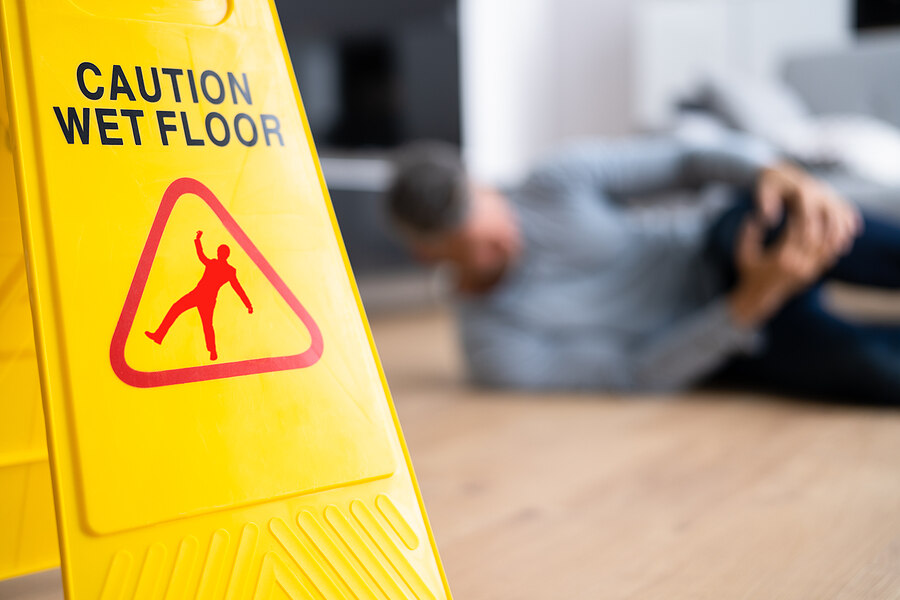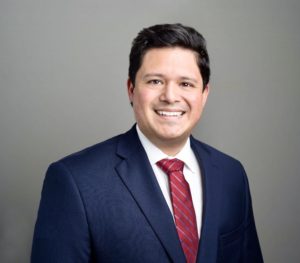Texas has unusual rules regarding injuries sustained in a slip and fall accident, so you’ll need a premise liability lawyer who understands all aspects of filing a claim and determining liability before filing an injury claim.
At the heart of every injury claim is liability. To establish that liability, one must first determine who was responsible for the existence of the condition that caused the accident in the first place.

Here are some of the questions that can help establish liability:
- Was the owner or one of their employees the reason for the slip and fall accident? – In this case, the person must have been responsible for a spill, or have caused a hazard to those entering the premises by not providing a warning that the surface was wet or slippery.
- Did the property owner have a process for repairing premises? – If your injury was the result of a torn or damaged carpet, a broken handrail or step, or a poorly lit hallway that was not correctly reported and repaired, then the property owner could be liable for your injury.
- If an object left in a hallway or on the ground caused your slip and fall, was there a valid reason for its location? – You would not expect to slip on wet leaves in the middle of a shopping center. There is no valid reason for them to be there, while there may be valid reasons why you may find them in entryways.
- Could your slip and fall accident have been prevented if there were a warning sign? – For example, it is reasonable to anticipate that if the weather outside is bad, someone should post a sign inside an entryway that says, “Caution: Wet Floor.”
Who Is Responsible for the Condition and the Fall?
Once you have answered these questions, the next step is determining who was responsible for the hazard that resulted in the slip and fall accident.
Liable parties may include:
- Owner or Employee of the Owner – if the owner failed to correct a defect in the property and they needed to do so, you can hold them and the employees responsible for inspections and repairs liable.
- Maintenance Company – in some instances, a property owner hires a company to handle regular property inspections and take care of everyday maintenance. If this is the case, then the maintenance company could be liable.
- The property lessee – lease agreements can make the lessee of the property responsible for operating costs. In triple net lease agreements, operating costs include maintenance. If the property was rented under this form of lease, maybe the owner is not liable, but the lessee is.
As you can see, finding out who is responsible requires investigating the condition that caused the slip and fall and investigating who may be ultimately held liable.
Limits on Who Can File a Premise Liability Claim
Texas property liability laws also include language that requires an injured person to prove they had a valid right to be at the property when the slip and fall accident occurred.
The three “categories” of people under Texas premise liability statutes are:
- Invitee – a person in the facility for a legitimate business reason. This could mean you are a shopper, a patient at a doctor’s office, or a diner in a restaurant.
- Licensee – this person has a legal reason to be on the premises. This would include a person making a delivery, a plumber or other professional providing services, or a friend of the owner/lessee of the facility.
- Trespasser – this category includes anyone who does not have the legal right or authority to be on the grounds.
In each case, the property owner or the lessee may owe a duty of care to the person who enters the property.
Duty of Care and Liability
The Texas Municipal League (TML) offers the best explanation for duty of care in premise liability cases. Page 10 of its Texas Tort Claims Act analysis contains clear definitions of the standard of care owed to each category of persons who enters a facility.
They are:
- Invitees – are owed duties of care by the property owner. This includes regularly inspecting their property for hazards, promptly correcting hazards, and warning invitees if a problem could harm them.
- Licensees – the property owner must warn about any hazard known to them that may injure a licensee. If the licensee has prior knowledge of a potentially hazardous condition and entered the premises anyway, the property owner may not be liable for a slip and fall injury.
- Trespassers – the property owner has no duty to warn of a hazard when someone is considered a trespasser. Only if a trespasser can prove the property owner deliberately set up a dangerous condition would they have any legal right to hold the property owner legally liable.
As you can see, this means as a slip and fall victim, you need to work with an experienced premise liability lawyer to protect your rights and get questions you may have answered.
How a Premise Liability Lawyer Can Help
The complex nature of a premise liability case makes hiring an attorney necessary.
Some of the steps a premise liability lawyer will take include:
- Evaluating evidence for fault and liability
- Demonstrating the extent of your losses, both economic and noneconomic
- Helping submit a demand for settlement of your claim
- Being prepared to negotiate on your behalf with insurers
- Preparing a slip and fall claim for court if necessary
Contact a Premise Liability Lawyer After a Slip and Fall Accident
It may not be immediately obvious who is liable in a slip and fall accident, and this is why you should get legal help. If you have suffered an injury after a slip and fall accident on someone’s property, then contact a personal injury lawyer today and get a free case evaluation, so you know your legal options and rights.

